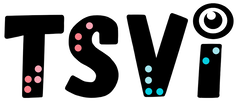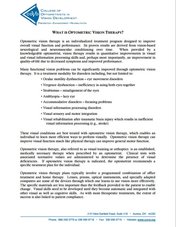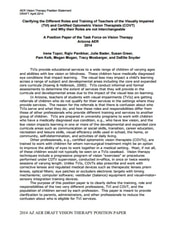- Home
-
Learn
- History of VI >
- Legislation & Laws >
- Vision Professionals >
-
VI Program Resources
>
- Program Printables
- Itinerant Teaching Tips
- Year at a Glance
- VI Program Handbook
- Caseload Analysis
- Organization & Time Management
- Professional Development
- Teacher Standards
- Professional Ethics
- Awards & Recognition
- APH Scholar Program
- Professional Organizations
- Certification Organizations
- Dealing with Challenges
- Professional Publications >
- Relatable Books for All Ages >
- Family Resources >
- Plan
- Basics
-
Teach
- Teaching Strategies >
-
Compensatory Skills Instruction
>
-
Social Skills
>
-
Self Determination
>
- Body Image & Acceptance
- Making Personal Goals
- My Vision Presentation
- My Self-Description
- Create a Personal Data Sheet
- Disclosure Decision
- Disability Statement
- Requesting Help
- Fighting Fears
- My Circle of Support
- Personal Responsibility
- Advocate for Safe Enviroments
- Having Picture Taken
- Coping with Change
- Aging Eyes
- Physical Characteristics
- Political Activism
- Laws Regarding Persons with Disabilities
-
Sensory Efficiency
>
-
Independent Living
>
- Orientation & Mobility Instruction >
- Recreation & Leisure >
-
Career & Vocation
>
-
Grow
- Complete Set Bonus >
-
Recorded Presentations
>
- Webinar: Tips for Being a "Physically Fit" TVI
- Webinar: The Art of Teaching the ECC
- Webinar: Virtual & F2F Strategies
- Webinar: Foundations of Teaching the ECC in the Age of Virtual Instruction
- Webinar: Itinerant Teaching Strategies
- Webinar: Using Themes to Teach the ECC
- Webinar: Conducting a FVLMA
- Webinar: Selecting the Right AT
- Webinar: Developing SMARTER Goals
- Webinar: Determining Service Intensity Using the VISSIT
- Webinar: Activities to Teach the ECC
- Webinar: Accessible Content for BLVI
- Webinar: Accommodations for VI
- Webinar: MIMO Strategies & Activities
- Webinar: SIDPID Strategies & Activities
- Webinar: Standard Course of Study Strategies & Activities
- Webinar: Job Tasks for Job, Career & Life
- Shop
- Jobs
Vision Therapy ControversyBy: Carmen Willings
teachingvisuallyimpaired.com Revised October 4, 2017 A subset of optometrists called developmental or behavioral optometrists, have been practicing vision therapy for decades. Vision therapy, also known as vision training, is an individualized, supervised, treatment program that is used for children (and sometimes adults) who have binocular vision problems, such as convergence insufficiency, focusing problems, tracking difficulties, eye teaming difficulties and for visual perceptual difficulties. The goal of the therapy is to train the brain to process visual information more efficiently. For most people, vision therapy means once a week visits to their optometrist's office for a period of time, where they work with the optometrist or a trained vision therapist working under the supervision of an optometrist. They will guide the patient through activities designed with the goal to correct visual processing problems and/or build visual skills. Programs typically involve eye exercises and the use of lenses, prisms, filters, occluders, specialized instruments, and computer programs. The therapist or optometrist might provide a few activities to work on at home. The vision activities (or exercises) usually take about 15 minutes a day. The therapy, that takes weeks to months, is closely monitored by vision therapists in the clinical setting.
What is the Controversy?This treatment is not usually prescribed by medical doctors (ophthalmologists) but is prescribed by optometrists (ODs) who specialize in this area. Many ophthalmologists feel that there is no benefit to vision therapy as there are few randomized, controlled trials that show the benefit of vision therapy. Although there have been cases where vision therapy has proven to be helpful, there have been only few valid scientific studies addressing the effectiveness of vision therapy. This is why there is a lack of acceptance of this as a treatment option within the vision field as a whole. Furthermore, the therapy is very costly (thousands of dollars) and is not covered by many insurance companies. There is a possibility that major medical may cover visual training (this may vary from state to state). Some optometrists have been able to successfully file it under the category of physical therapy, but that depends on the insurance company.
Is Vision Therapy Provided by the School?If a family chooses to participate in vision therapy, they must understand that it is performed by Vision Therapists, not Teachers of Students with Visual Impairments, in a clinical setting and homework is provided for home use. As stated earlier, Vision Therapists are not employees of schools but rather in medical settings. It is at the discretion of school districts whether or not they will pay for these outside therapies. For those students who are prescribed vision therapy, a doctor should provide intervention. IDEA and the No Child Left Behind, Elementary and Secondary Education Act require educators to consider evidence-based educational practices. Due to the lack of scientific evidence of the efficacy of eye exercises, vision therapy as an educational intervention is not practiced by educators, specifically a Teacher of Students with Visual Impairments (TVI).
Additionally, vision therapy is considered a medical service and therefore in most states, it is excluded as a related service under IDEA and should not be listed on the IEP (Some states, such as California, do provide Vision Therapy Services and Vision Therapists are employed by the school - separate from Teachers of Students with Visual Impairments). If a family decides to participate in vision therapy it should be obtained privately through an optometrist or vision therapist under the guidance of an Optometrist. Teachers of Student with Visual Impairments do, however, teach visual efficiency skills which should not be confused with vision therapy. Instruction in visual efficiency skills may be included in the IEP for students who are eligible and in need of instruction by a TVI as it is a part of the Expanded Core Curriculum. Although vision therapy is typically not provided by the schools, the students may still receive adaptations or other services that may help them. The optometrist may recommend school accommodations that may assist the student throughout the day. These recommendations are generally simple to provide and may include using a line guide or a bookmark to keep their place while reading, positioning books on a slant board or incline, receiving a copy of notes or information presented on the board and being seated closer to the board. Keep in mind that although the student may need support or accommodations in these areas related to vision, they will typically not meet the eligibility criteria to be identified as a student with a visual impairment as the criteria for that label is reserved for students who are severely impacted by their vision (see eligibility criteria). Although the student may not meet the eligibility criteria for vision services provided by the school, the student may meet the eligibility criteria for school based occupational therapy. The occupational therapist may be able to work with the student in the area of sensory processing problems. Similarly, they may be able to receive support from a reading specialist. The information presented here was taken from the Boston Children's Hospital FAQ's on vision therapy; wikipedia on vision therapy; and the Optometrist Network.
Position PapersThe College of Optometrists have created a position paper on the topic of vision therapy. The Association of Education and Rehabilitation of Blind and Visually Impaired (AER) has also created a position paper. Both can be downloaded and printed for your reference:
|
History of Visual Impairments
Professional Practice
Vision Professionals
Professionalism
Teacher Resources
Professional Publications
VI Book Resources
Family Resources
VI Referrals
Medical vision exams
visual diagnosis
fvlma
|
|
Teaching Students with Visual Impairments LLC
All Rights Reserved |
- Home
-
Learn
- History of VI >
- Legislation & Laws >
- Vision Professionals >
-
VI Program Resources
>
- Program Printables
- Itinerant Teaching Tips
- Year at a Glance
- VI Program Handbook
- Caseload Analysis
- Organization & Time Management
- Professional Development
- Teacher Standards
- Professional Ethics
- Awards & Recognition
- APH Scholar Program
- Professional Organizations
- Certification Organizations
- Dealing with Challenges
- Professional Publications >
- Relatable Books for All Ages >
- Family Resources >
- Plan
- Basics
-
Teach
- Teaching Strategies >
-
Compensatory Skills Instruction
>
-
Social Skills
>
-
Self Determination
>
- Body Image & Acceptance
- Making Personal Goals
- My Vision Presentation
- My Self-Description
- Create a Personal Data Sheet
- Disclosure Decision
- Disability Statement
- Requesting Help
- Fighting Fears
- My Circle of Support
- Personal Responsibility
- Advocate for Safe Enviroments
- Having Picture Taken
- Coping with Change
- Aging Eyes
- Physical Characteristics
- Political Activism
- Laws Regarding Persons with Disabilities
-
Sensory Efficiency
>
-
Independent Living
>
- Orientation & Mobility Instruction >
- Recreation & Leisure >
-
Career & Vocation
>
-
Grow
- Complete Set Bonus >
-
Recorded Presentations
>
- Webinar: Tips for Being a "Physically Fit" TVI
- Webinar: The Art of Teaching the ECC
- Webinar: Virtual & F2F Strategies
- Webinar: Foundations of Teaching the ECC in the Age of Virtual Instruction
- Webinar: Itinerant Teaching Strategies
- Webinar: Using Themes to Teach the ECC
- Webinar: Conducting a FVLMA
- Webinar: Selecting the Right AT
- Webinar: Developing SMARTER Goals
- Webinar: Determining Service Intensity Using the VISSIT
- Webinar: Activities to Teach the ECC
- Webinar: Accessible Content for BLVI
- Webinar: Accommodations for VI
- Webinar: MIMO Strategies & Activities
- Webinar: SIDPID Strategies & Activities
- Webinar: Standard Course of Study Strategies & Activities
- Webinar: Job Tasks for Job, Career & Life
- Shop
- Jobs



